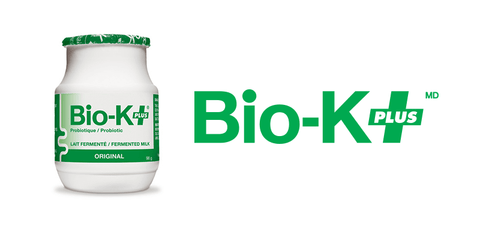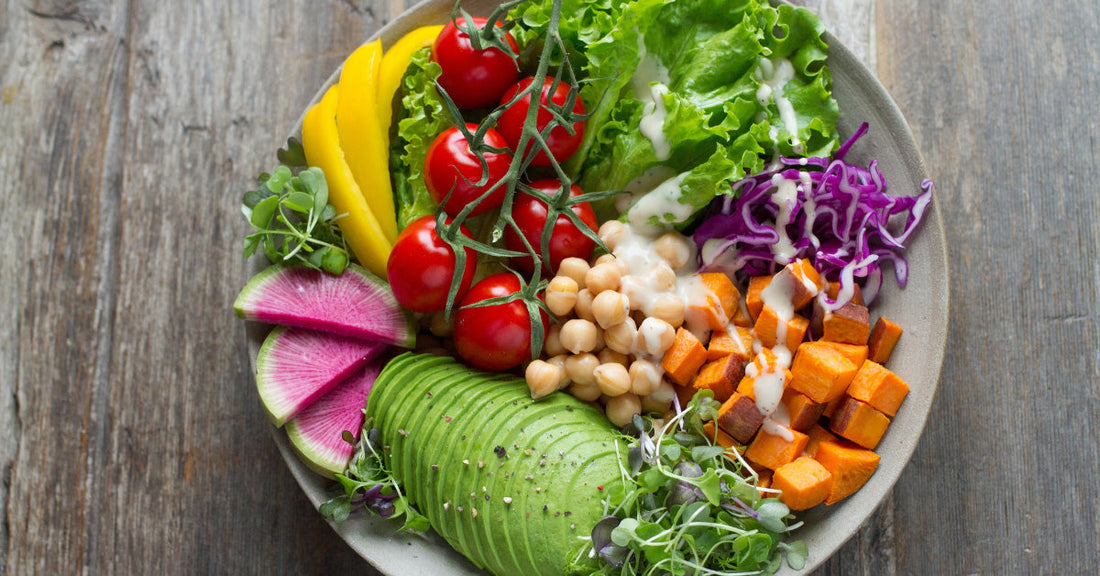Why is a plant-based diet good for the intestinal flora?
With the start of a new year, many people take the opportunity to set new health goals for 2019. One of these goals is often the desire to eat better.
But in a world where many fad diets are in the media, it is sometimes difficult to make the right choices and to be sure that you are making the right food choices. One thing is for sure, choosing to include more plant-based foods in your diet is not a mistake. Health Canada's new Food Guide has just made this shift.
In addition to offering an impressive vitamin content, plants provide fibre that promotes the health and development of intestinal flora. Some fibers are considered prebiotic and have the power to positively influence the intestinal flora.
What is a prebiotic?
In order to fully understand the role of prebiotics, let's first review what a probiotic is.
It is a bacterium that provides beneficial effects to our body and our health. Probiotics are an integral part of the intestinal flora and cohabit with many other intestinal microorganisms. Probiotics are credited with many health benefits, including boosting immunity, improving digestion, preventing skin disorders and providing mental stability.
Find out more about probiotics here!
However, these beneficial bacteria need to feed on carbohydrate-rich compounds in the diet. That's where prebiotics come in.
Found in some foods and supplements, prebiotics are carbohydrates (sugars) that stimulate the fermentation of probiotic bacteria in the digestive system. This results in nourishing and supporting the intestinal flora. These prebiotic benefits are attributed to pectins, polyphenols, resistant starches and inulin. 1,2,3
Sources of prebiotics
Since prebiotics are derived from plant foods, it is possible to obtain them through a healthy, diversified and fiber-rich daily diet.
Several types of prebiotics have been identified and provide important benefits to the intestinal flora.
Inulin is considered an important prebiotic fiber. It is found in abundance in :
- Asparagus;
- The Jerusalem artichoke ;
- Leeks and onions;
- Dandelion leaves;
- Okra; 4
Some fruits also have prebiotic effects due to the presence of pectin or resistant starch. This is the case of :
- Raspberries;
- Apples;
- Bananas ; 5
Finally, the scientific community believes that polyphenols have prebiotic properties. These phytochemicals are present in :
- Raw cocoa;
- Berries;
- Green tea;
- Legumes; 1
Whole grains, fermented milk products and breast milk are also excellent sources of prebiotics. 3
According to health professionals, prebiotics should be part of the daily diet. These substances, which are beneficial to the intestinal flora, are present in many plant foods. This is why a diet rich in fruits, vegetables and whole grains provides a significant and diversified quantity of prebiotics to the intestinal flora and contributes to the maintenance of good health.
Combining prebiotics and probiotics
Prebiotics and probiotics provide an important pillar to intestinal health. Together they can produce a synergistic and symbiotic effect. Only when this harmony is achieved does the prebiotic effect occur. Under the prebiotic effect, the number of good bacteria present in the intestine increases due to the presence of prebiotics.
This is why it is necessary to consume not only prebiotics, but also probiotics. The more probiotics are present, the more they are able to take full advantage of the presence of prebiotics and thus create the synergistic effect.
To take full advantage of the benefits of probiotics, opt for the following products Bio-K+ products, whose scientific rigour ensures the quality and effectiveness of the beneficial bacteria. Bio-K+'s ready-to-drink probiotics offer vegan options and are available in several flavours. By combining Bio-K+ with a plant-rich diet, you will support the prebiotic effect and strengthen your health.

Join the community Bio-K+ community community for more health tips. Contact Bio-K+or follow themFacebook andInstagram.
Véronique Cousineau N.D
Sources :
1 : Bio-K+. A plant-based diet to feed our probiotic bacteria. Desiree Nielson, Dt.P. August 01, 2018.
2: Staying healthy with nutrition. 21st century edition. Elson M. Haas, MD. Pages 272-273.
3 : Bio-K +. What is a prebiotic? Desiree Nielson, Dt. P. September 14, 2018
4: Healthline. 19 best prebiotic foods you should eat. Evidence based. Arlene Semeco, MS, RD. June 8, 2016
5: Simpson, H L and B J Campbell. "Review article: dietary fiber-microbiota interactions" Alimentary pharmacology & therapeutics vol. 42,2 (2015): 158-79.
6 : Bio-k+. Probiotics and prebiotics: the two go together. Desiree Nielson, Dt P. September 15, 2017


